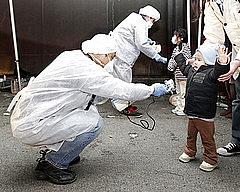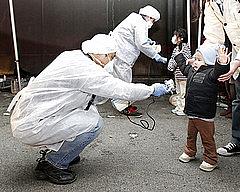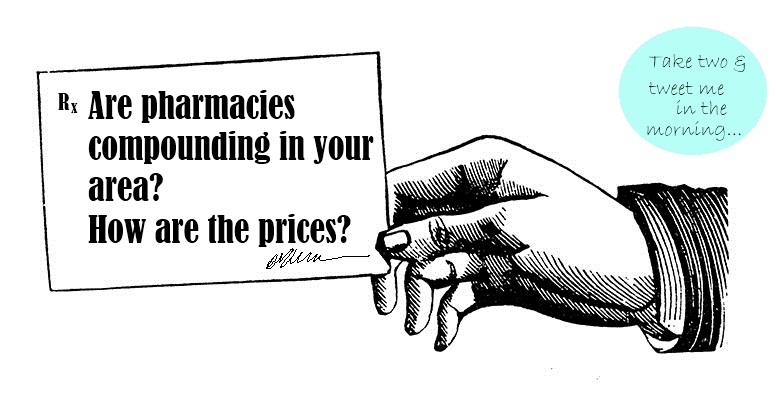Profiteering From A Panic: The $1,740 Potassium Iodide Supply


Unfortunately for people who were heading out on short notice to do relief work in Japan, the fallout of the potassium iodide panic had serious repercussions close to home. Just ask Kellie Moore.
She volunteered to do the leg work for two different sets of people who were going directly to Sendai. One couple was going to try to evacuate frail elderly parents who'd been living there before the devastation. And a trio was going to provide disaster aid. They all needed to start taking potassium iodide pills right before they left.
With only 48 hours' notice, finding potassium iodide in the midst of a panic was going to be a thankless job, but Kellie wanted to help. So she spent two solid days trying to find potassium iodide in the Bay Area.
Endless phone calls later, she discovered some potassium iodide at the Ross Valley Pharmacy, and the staff told her over the phone that a two-week supply would cost $25 per person. For five people, that would be $125. But when Kellie arrived to get it, the actual charge was an eye-popping $1,740.
Keep in mind that this is a substance that is normally sold without a prescription for $1 a pill, including shipping, from an FDA-approved, CDC-linked source. Kellie spoke to numerous people at the Ross Valley Pharmacy about this excessive price, including the pharmacist, Hans, who came from behind the counter to explain that they were "compounding" it, so that made the pill more labor-intensive. Since the pills were for aid workers, Kellie was offered a discount, reducing the price to an even $1,000.
Which was still way too much. Since their flight was that same evening, the two people trying to evacuate elderly relatives had to get on the plane and go straight into the high radiation area without potassium iodide. The trio of people had a couple more days, and eventually Kellie found another source.
If you call now (as I did), there is still potassium iodide sitting in the Ross Valley Pharmacy. And they'll still tell you it's $25 for up to 12 pills. When asked to explain Kellie's experience and the price discrepancies, Bridget, who was introduced to me as "a pharmacist and the owner's daughter," said that the Ross Valley Pharmacy decided to drop the price "one or maybe two days" after Kellie's $1,740 charge.
When asked what the reason was for their steadfast extortionate pricing during the peak of the panic, Bridget explained that "we thought you only needed one pill."
Besides the obvious ethical issues this situation raises about panic, profiteering and health, I was personally, as a doctor, more than a little surprised to have a pharmacist justify an outrageous price by saying they didn't actually understand the appropriate dosing of a drug - a drug the pharmacist is not only selling, but also, reportedly, still making. Especially when that same dosing information was, and is, readily available to the public on the CDC's website.
The regulation of compounding pharmacies is a complex and changing topic. But even if you just think purely about the pricing of drugs, what's remarkable is how far behind we are at tracking drug prices than we are at tracking, say, the Dow Jones. The Agency for Healthcare Research and Quality did a recent round-up of average prices by prescription drug class, including the percentage of Americans taking those drugs. But that's a pretty crude approach, compared to the ticker tape of real time price data for stocks. Forbes' last survey, in 2010, of the highest priced prescription drugs showed their top at $409,500 (Soliris), but another contender, idursulfase, is actually dosed based on your weight. If you weigh 150 pounds, you'll need six vials a week. With a wholesale price of $3,285.25 per vial, the actual total is $1,024,998 a year.
With those kinds of numbers, it's hard to argue there's not a lot at stake, even if you try to ignore the life-or-death angle. Shouldn't we, as a society, have a running, accurate list of the top ten most expensive drugs? The top 100?
And potassium iodide profiteering shows the potential for exponential price increases. Is there any insider-trading equivalent for pharmacies? Perhaps it's time we put as many resources into safeguarding and tracking our drug prices as we do our stocks.
 What do you think? Should we be tracking drug-price numbers more closely? Is profiteering during a drug shortage a predictable, unavoidable problem? Are local compounding pharmacies in your community producing potassium iodide? With only three FDA-approved potassium iodide products on the market, and all of them out of stock, what are the restrictions on compounding pharmacies who want to start making the product? After all, there is a lot of gray zone between the words "manufacturing" and "compounding." Where is the oversight and testing? Should there be more?
What do you think? Should we be tracking drug-price numbers more closely? Is profiteering during a drug shortage a predictable, unavoidable problem? Are local compounding pharmacies in your community producing potassium iodide? With only three FDA-approved potassium iodide products on the market, and all of them out of stock, what are the restrictions on compounding pharmacies who want to start making the product? After all, there is a lot of gray zone between the words "manufacturing" and "compounding." Where is the oversight and testing? Should there be more?
Sound off in the comments section.
Photo credit: Kordian via Flickr
Graphic credit: R. Jan Gurley

